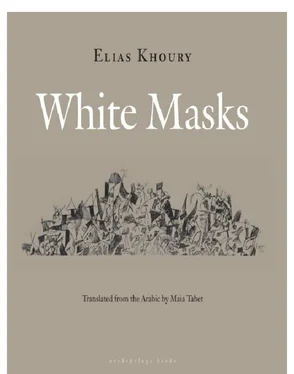When Nadeem insisted, she started shaking she was so upset. “I know what it is,” she said, “you want your inheritance while I’m still alive! You want to take the furniture and the house and the money I collect for my dead husband and son.”
Nadeem is so furious, he won’t visit her anymore. But he says I should. He wants me to stay on good terms with her — he’s worried that she’s going to leave everything to Su’ad!
“Money loves money,” he says, “and that fatso would love to add your mother’s to his.”
Me, I’m not worried about the inheritance — it’s her that worries me. When they brought my father’s body home, she went into a trance-like state. She wouldn’t see anyone, she just sat in the room by the closed coffin, keening and begging us to open it. Nadeem told her we couldn’t. But of course Su’ad’s husband had to say that it was her right, and that she should be allowed to see her husband one last time.
“The corpse is already decomposing,” Nadeem told him.
“So what. . It’s still her right. .!”
So they opened it — oh my God, you can’t imagine the stench that enveloped the house. It was the same kind of smell as when my father used to lock himself in there, but much, much worse. It was literally unbearable. Everyone left the room, except for my mother. Then Nadeem went back in and shut the coffin.
“Ma, no more. . It’s enough.”
And then, all of a sudden, out of nowhere, the house swarmed with gunmen and gunfire filled the air.
After the funeral, their leader came to see us. I don’t remember his name anymore, but one of his arms was just a stump, and he bristled when he spoke. After seating himself in the center of the living room, he began while everyone listened with rapt attention.
“The martyr’s father has himself become a martyr. Khalil Ahmad Jaber has sacrificed his life for the revolution. What happened to him is unimaginable and we hereby declare him a martyr. Truly, he is a martyr!”
Everyone dropped their heads and invoked the Lord’s mercy for the deceased while my mother looked at him with utter consternation.
“But we’ve got to find out who did it,” Nadeem said.
“Yes, absolutely. And that is our responsibility. All of you please take note, please, that I am personally taking personal responsibility for this: the murderer will be arrested and will be hanged from one of the famous Beirut pines.”
Then he launched into a eulogy of my father, extolling his support for the revolution, his affection or its combatants, and the encouragement he gave his son to join the ranks and even make the ultimate sacrifice. He said that after Ahmad had died on the battlefield, his father had praised the Lord and bidden his wife to trill with joy.
My mother nodded heavily.
“That’s right! She ululated! It shouldn’t surprise you! Isn’t a martyr on earth a prince in heaven? ‘Think not of those who are slain in the way of Allah as dead. .’” Then he looked to us to finish the Qur’anic verse, and Su’ad’s husband intoned: “‘Nay, they are living. With their Lord they have provision.’”
And he got up and left.
And the visits started. To start with, he told me they had decided to give my mother a stipend of 1,000 lira a month, as a sort of living allowance. Then on the seventh-day memorial, he came in carrying big red and blue posters.
“They’re even bigger than the ones they made for Ahmad,” my mother remarked.
“Yeah, we’ve changed the format,” he said. “We’re making them larger now.”
And he started telling us how he had plastered the walls of the city with them.
“Everybody must see the martyr’s picture — especially a martyr as unique as Khalil Ahmad Jaber. It’s not every day that a fifty-year-old man is killed in such a barbaric way — God forbid! Everyone must see his picture. We’ve hung it everywhere. The walls of Beirut are plastered with his picture.”
My mother smiled. It was the first time since my father’s disappearance that I had seen her smile. She picked up the posters and as she gazed into his face with tears in her eyes, she murmured: “Dear, dear Abu Ahmad, you deserve far more than this.”
Then she hung one in the living room, another one in the bedroom and put away the rest of them in her wardrobe. He’d brought a lot of posters with him, around two hundred of them.
Then he left.
After that, my mother started going to the party office frequently. When I asked her why, she said she was following up with them about the marble gravestone.
“They’re going to erect a big marble gravestone. It’s going to be the biggest one in the whole of the Martyrs’ Cemetery. It’s going to be really beautiful! And I’ve asked them to change the marble on Ahmad’s grave. They said they’d consider it. It’s not easy, the man in charge told me, because they can’t give him preferential treatment. They have to treat him the same as all the others. But he said he’d think about it. So I keep going to see what they’ve decided. They promised that Abu Ahmad’s tombstone would be ready in two weeks.”
“But, Mother, that doesn’t make sense,” I told her.
“What do you mean? Anyway, what do you know? You don’t understand anything and your husband’s just a dope-head.”
I told her Nadeem had changed. She didn’t believe me.
“Don’t be fooled,” she said, “I know him. I know what men are like. Just you wait and see, he’ll be gambling and smoking again in no time. But watch those children of yours, young lady, you’ve got a baby now. Goddamn that husband of yours, why did he have to name him Hassan?”
I had told Nadeem I wanted to name the baby Ahmad, but he wouldn’t hear of it.
“We’re going to call him Hassan,” he said, “after Abu Saïd, God rest his soul in peace.”
“So you prefer Abu Saïd to my brother, eh?”
“Abu Saïd was my friend.”
And so we called the baby Hassan, and Nadeem even nicknamed him Abu Saïd. “I’ll do as I please,” he says.
Well, let him, and I’ll do the same. But, still, I call the baby Hassan. It doesn’t make any sense for me to call him Ahmad and for Nadeem to call him Hassan. And since that’s his name, I call him Hassan.
But my mother. . I really worry about her. She frightens me. She’s not herself anymore. Whenever I go and visit her, I find her sitting in Father’s room, staring at the posters all laid out on the bed. She sits there for hours on end. When I yell at her and tell her it’s enough, she jumps up, gathers them together carefully, and puts them back in the wardrobe. As if they constituted her entire worldly wealth! I don’t understand how she can think that! It makes no sense: she gets a martyr’s stipend of 1,500 lira now. And I slip money her way too, I don’t dare tell Nadeem though. He never asks how I spend the housekeeping money, poor dear, that’s his one quality — he’s generous to a fault. He always gives me whatever I ask him for.
What I want to know is what she does with all that money she’s getting. Once I asked her, but she wouldn’t tell me. She started saying that life had become very expensive and the sheikha charged a lot. What sheikha, I said, but she wouldn’t answer.
Then, one day she said that Father had asked her to hang his posters throughout our neighborhood, and she wondered whether Nadeem would do it. I questioned how it was possible for Father to speak to her since he was dead. She said it had been his spirit.
“What spirit?”
“Oh, I had his spirit summoned. And he, his spirit I mean, asked me to do it.”
I really lost it then. I told her that if she carried on with all that superstitious mumbo jumbo, it would be the end of us. But I regretted it when I got home. Maybe she was right, maybe. . who knows? Everyone says the sheikha has miraculous powers. Maybe she really could summon spirits.
Читать дальше












